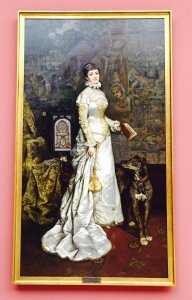Presented By: Copernicus Center for Polish Studies
CPPS Lecture. Women, Class, Performance: Helena Modjeska as Understudy and Impresario
Beth Holmgren, professor of Slavic and Eurasian studies, Duke University

Helena Modrzejewska (1840-1909), the great Polish actress who emigrated to the U.S. mid-career to conquer the American stage as Helena Modjeska, ingeniously wielded her talent as a performer to achieve rapid social mobility and sociocultural power. Not coincidentally, Modrzejewska’s chief mentors in this achievement were strategically placed aristocratic women in Poland and “respectable” American women writers, intellectuals, and artists who were instrumental in brokering new norms for high culture and professional activism. Modjeska had the good fortune to attain stardom in two national contexts where upper-class cosmopolitan women, the dictators of social taste, began to embrace serious actresses as desirable equals and the most effective public messengers for the arts.
This talk explores Modrzejewska/Modjeska’s development from sociocultural understudy to impresario on two continents, highlighting key interactions with her mentors. Born illegitimate in a lower middle-class Kraków family and the unwed mother of two children, Modrzejewska the actress first had to successfully emulate and win the approval of Kraków’s aristocracy and then qualify as a mover and shaker in the more hybridized upper-class society of Warsaw, where she kept her own salon and reigned on the stage of the Teatr Wielki, implementing new repertoire. Her progress in these cities was paved by the interventions of, respectively, Countess Arturowa Potocka and Countess Maria Kalergis-Muchanowa. In America, Modjeska easily established her respectability before a public ignorant of her past, yet she had to prove her talent as an English-speaking actress of serious drama and, in the process, connect with a nationwide network of women writers, critics, intellectuals, and artists (ranging from Annie Adam Fields to Willa Cather) to cultivate sociocultural influence. In Poland and the United States, Helena Modjeska depended on an elite, often eccentric sisterhood to vouch for her class and empower her public persona.
Beth Holmgren is professor of Russian and Polish cultures in Duke University’s Slavic and Eurasian Studies Department. Recent books include Starring Madame Modjeska: On Tour in Poland and America (Indiana, 2012), which won four national awards, and Americans Experience Russia: Encountering the Enigma, 1917 to the Present, edited with Choi Chatterjee (Routledge, 2013). She is currently working on two books, one a co-edited volume with Yana Hashamova and Mark Lipovetsky, Transgressive Women in Modern Russian and East European Cultures: From the Bad to the Blasphemous, the other a monograph, How the Cabaret Went to War, about the experience and influence of acculturated Jewish cabaret artists attached to the Polish II Corps during World War II.
This talk explores Modrzejewska/Modjeska’s development from sociocultural understudy to impresario on two continents, highlighting key interactions with her mentors. Born illegitimate in a lower middle-class Kraków family and the unwed mother of two children, Modrzejewska the actress first had to successfully emulate and win the approval of Kraków’s aristocracy and then qualify as a mover and shaker in the more hybridized upper-class society of Warsaw, where she kept her own salon and reigned on the stage of the Teatr Wielki, implementing new repertoire. Her progress in these cities was paved by the interventions of, respectively, Countess Arturowa Potocka and Countess Maria Kalergis-Muchanowa. In America, Modjeska easily established her respectability before a public ignorant of her past, yet she had to prove her talent as an English-speaking actress of serious drama and, in the process, connect with a nationwide network of women writers, critics, intellectuals, and artists (ranging from Annie Adam Fields to Willa Cather) to cultivate sociocultural influence. In Poland and the United States, Helena Modjeska depended on an elite, often eccentric sisterhood to vouch for her class and empower her public persona.
Beth Holmgren is professor of Russian and Polish cultures in Duke University’s Slavic and Eurasian Studies Department. Recent books include Starring Madame Modjeska: On Tour in Poland and America (Indiana, 2012), which won four national awards, and Americans Experience Russia: Encountering the Enigma, 1917 to the Present, edited with Choi Chatterjee (Routledge, 2013). She is currently working on two books, one a co-edited volume with Yana Hashamova and Mark Lipovetsky, Transgressive Women in Modern Russian and East European Cultures: From the Bad to the Blasphemous, the other a monograph, How the Cabaret Went to War, about the experience and influence of acculturated Jewish cabaret artists attached to the Polish II Corps during World War II.